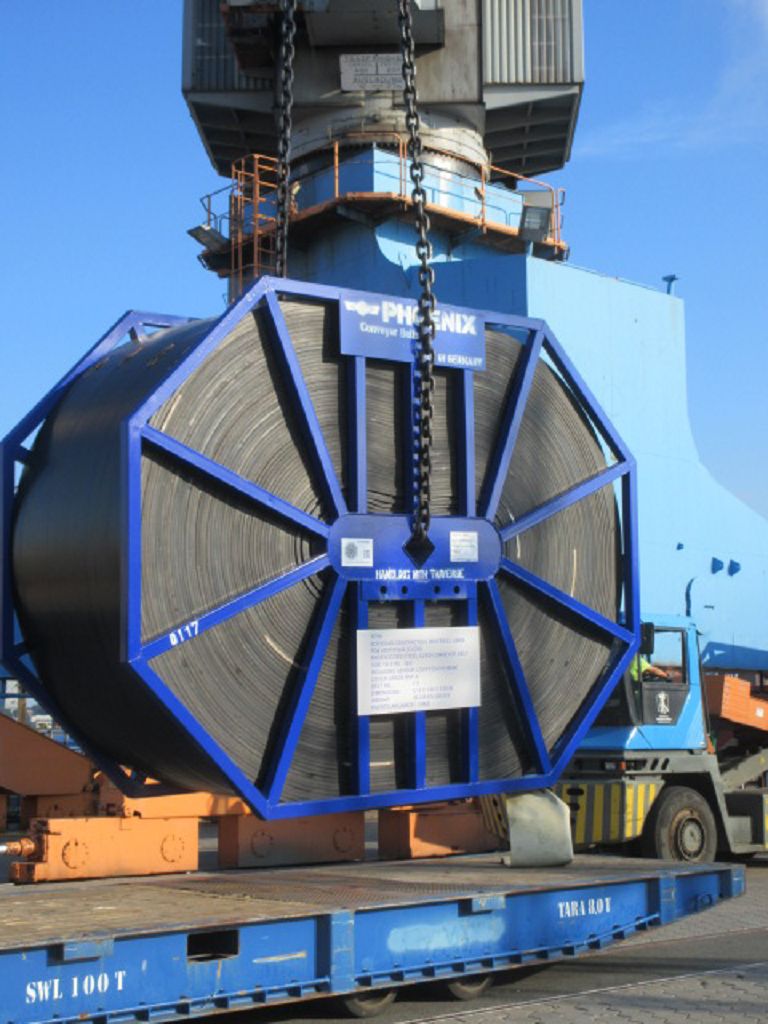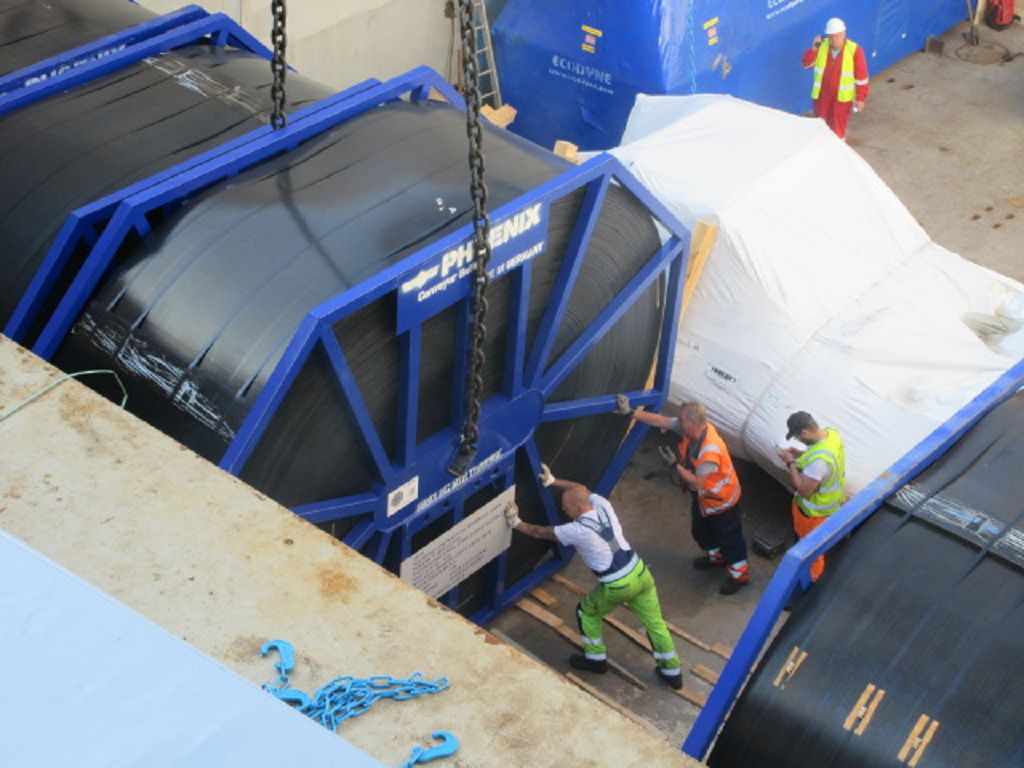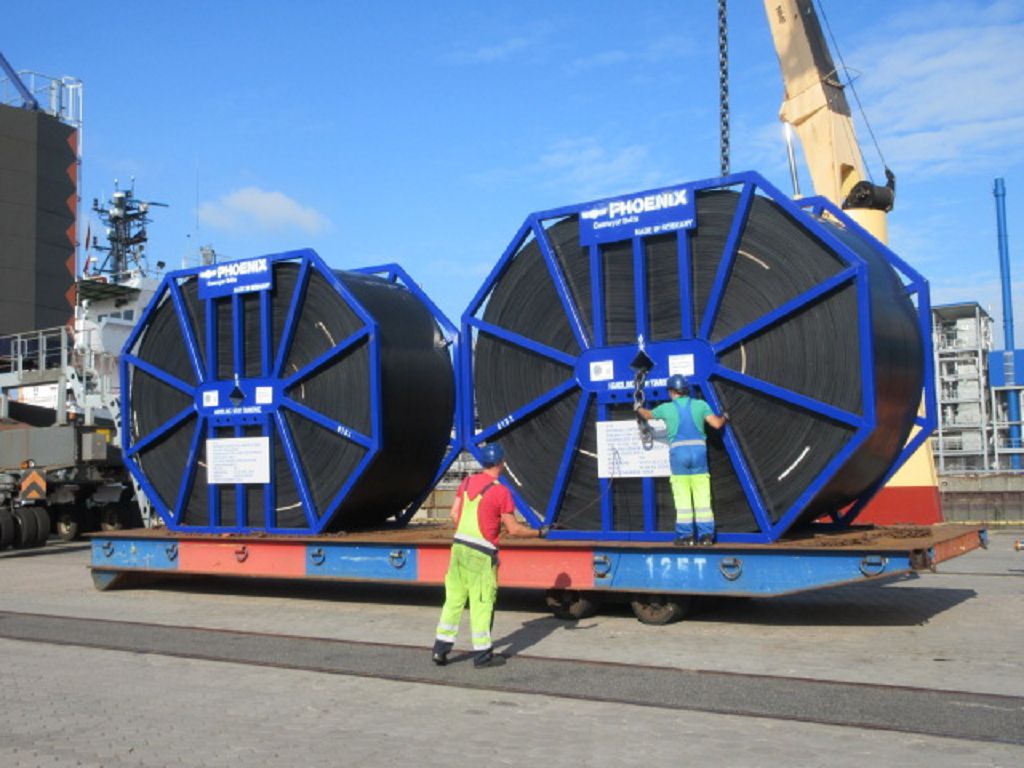IFLN News 2018
PROJECTS: Reeling in the Miles: From Germany to Chile

Merkur, MIQ, Phoenix conveyor belt
Merkur Project GmbH and MIQ Logistics Inc. – both members of the IFLN Global Projects network – have collaborated on the process of moving a consignment of outsize conveyor belts from Germany to Chile.
Between June and August, a total of 19 reels of conveyor belt, each weighing almost 39 tons and measuring 515 x 186 x 385cm, were moved from Hamburg to a very distant mine site in the western South American country of Chile.
MIQ Logistics oversaw the shipment's handling from its office in Santiago, Chile. The client, Minera el Abra, is a Freeport McMoRan company, a leading international mining company headquartered in Phoenix, Arizona.
The Phoenix conveyor belts were moved EXW from the German factory overland to the port of Hamburg, before their ocean-going voyage to the Chilean port of Angamos.
Once Customs-cleared there, the belts reels will be moved overland to the mine site. The total weight of the freight is 741 tons, and the total volume of the cargo amounts to more than 700 cubic metres.
Alfredo Byrne, MIQ Logistics’ agent development manager Latin America, explains that MIQ is very experienced in handling these sorts of jobs. While it also acts as a standard freight forwarder, it also has an experienced and busy projects division that is no stranger to handling the movements of these sorts of outsize shipments.
He says that the most challenging parts of such shipments are the land transport aspects, and it is no different in this case. Moving the reels out of Port Angamos, for example, requires not only the relevant government permits but also the temporary relocation of some municipal infrastructure, like street lights and road signs.
The height of the freight is the greatest issue here. The distance of 200km from the port up into the mountains to the mine is also a serious challenge to be overcome that requires special skills and careful planning, while the mine itself is to be found at no less than 4,000m above sea level. A three-axle lowboy semi-trailer will be used to carry the reels overland to their final destination.

Merkur, MIQ, Phoenix conveyor belts being handled
German Efficiency
But, prior to its arrival in Chile and indeed any actual transport of the cargo, MIQ had sought an efficient partner to handle the German end of the shipment process and, checking through the IFLN Global Projects network database, quickly settled on Germany-headquartered Merkur Project with which to collaborate on the job. The two forwarders then went through a long phase of careful planning prior to any actual cargo movements, just to ensure that everything goes as smoothly as possible.
Specifically, Merkur helped with the transport of the reels from Bad Blankenburg to Hamburg, from where the freight was shipped to Chile. According to Jürgen Evers, Merkur Project’s project director: “MIQ approached us, asking if we were able to help with the pre-carriage in Germany. The Germany-based part of this shipment was solely organised by Merkur Project.”
The first exchange of messages regarding the shipment took place on 5 April this year, with the actual transport order coming on 7 May. Initial shipment took place from Bad Blankenburg to the port of Hamburg between late June and the first half of July, with the reels loaded onto the ocean-going, Chile-bound vessel on 23 July.
“We were responsible for the delivery from Bad Blankenburg – where the reels were assembled – to the port of Hamburg, as well as storing the goods at the port and organising the FOB handling,” Evers informs. “Additionally, we acquired the Germany-based necessary documents, like export Customs documents and road permissions.”
A number of challenges were associated with this particular job, says Evers. “Obtaining the road permissions and completing bridge calculations and static testing of the designated route within the timeframe of 4 to 6 weeks was particularly difficult.” The designated route had a length of approximately 525km.
“Another difficulty was organising a special hauling vehicle fitting the dimensions of the reels, as well as delivering and unloading them within three weeks,” he continues. “That was due to the fact that cargo with dimensions this large can only be shipped by road [in Germany] between 10pm and 6am at night on working days (Mondays to Fridays), while being escorted by police vehicles.”
The Fruits of Successful Cooperation
Collaborating with an IFLN cargo agent proved a very positive experience, Evers remarks. “The whole collaboration with MIQ worked out well.” And as to future possibilities: “We would really like to establish/develop more business with both MIQ and other IFLN freight forwarders. We are constantly looking for new opportunities to realise business with new freight forwarders,” Evers declares.

Merkur, MIQ, Phoenix conveyor belts on trailer
“From our point of view, large-scale operations in this line of work perform best when you are working together with other freight forwarders, where everyone has a certain aspect that they are specialised in. That way, a shipment can be delivered in the safest and most satisfying way.
“By combining all the different knowledge and skills from everyone involved, while maintaining a situation where they can focus on their ‘specialised scope of work’, everyone involved will benefit.
“In that sense, IFLN offers a great platform where all of us are able to find reliable freight forwarders from (nearly) all over the globe,” Evers adds.
And Byrne is clearly of the same mind. He said that the decision to cooperate with IFLN member Merkur has been a big success, the German project logistics specialist having done a great job and made it all look “very easy”.
But the same, too, can be said of MIQ’s efforts in handling the complex transport of the outsize cargo in Chile and its oversight of the whole project.
Previous News IFLN News
